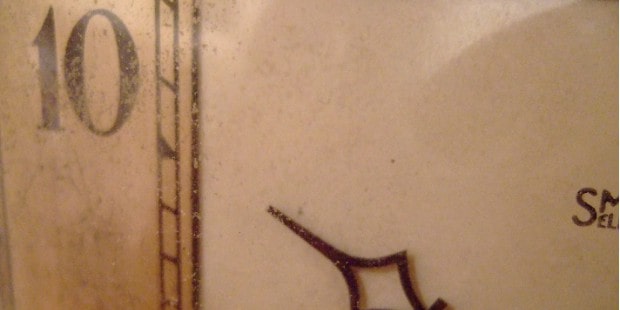 The following is a guest post by Dave Morris. Dave is a storyteller, poet, improviser and musician based in Victoria, BC. He’s also a pal of mine. He’s one of the few people in my city that I can talk about what I do and he “gets” it. It’s hard to believe that we met over a decade ago when I went to Vancouver to do some improv at The Roundhouse. Time flies when you’re having fun — and Dave may have the key to making that happen for everyone with this post. You can check out his work at his website and follow him on the Twitter. I suggest you do both.
The following is a guest post by Dave Morris. Dave is a storyteller, poet, improviser and musician based in Victoria, BC. He’s also a pal of mine. He’s one of the few people in my city that I can talk about what I do and he “gets” it. It’s hard to believe that we met over a decade ago when I went to Vancouver to do some improv at The Roundhouse. Time flies when you’re having fun — and Dave may have the key to making that happen for everyone with this post. You can check out his work at his website and follow him on the Twitter. I suggest you do both.
work (wûrk)
n.
something that takes my full attention for a set amount of time.
I try to work as little as possible.
Actually, that’s not true. I try to work as much as possible, just within the least amount of time. So it looks, from a distance, like I’m never really working. Or, as I like to say, when I work I work really hard but only when I work.
Then again, I’m lucky, unlike most professions, mine calls for playing as a part of my work. I am an improviser. So my job involves teaching, performing, producing and talking about improvisation, and since all improvisation begins with play, I’m laughing. I know, rough life.
I do have less fun parts of my job. I spend a little more time than you’d think in Photoshop designing posters and flyers, and in Coda 2 updating and designing my website(s)… and of course, I email (I doubt even a percentage of the email most web related professions do, so I’m not going to complain too much).
I do, however, prefer play over work. So I’ve developed a system I call The 10 Hour Work Week which leaves me 158 hours a week for playing, which is to say “research.” Now you’ve heard of The 4 Hour Work Week (too little for me) and the 40 hour work week (way too much for me) but I thought I’d divide one by the other and boom, a perfect balance.
Now, 10 hours isn’t a lot of time, in fact it’s not enough time to get all of your work done, which is where my definition of work comes into play (see above). My definition means that when I’m teaching, I’m working. When I’m emailing I’m not. I know, just saying it like that probably cuts your work in half.
I’ve come to this conclusion simply because when I’m teaching I can’t stop when I feel like it, my students wouldn’t appreciate it very much, but I can answer emails whenever or wherever I want – sometimes I don’t even reply. I email at my own leisure so it wouldn’t be fair to consider that work, would it? The same goes for writing blog posts, or editing promo photos, or anything I could do just as easily at three in the morning with no pants on, as I could do in an office wearing a suit.
The 10 hour work week is more a state of mind than a schedule. It’s more about redefining what you consider work and less about trying do less work. It’s a reimagining of how your time is spent. If you work for yourself then you are always working. Your life is your job. And as long as you have the right mindset, there’s absolutely nothing wrong with that. I do spend more than 10 hours a week making my business better and preparing for upcoming projects, but I only spend 10 of those hours working.
Try it. Get yourself an iPhone, or something similar, and start sending emails from bed, or while in line at the grocery store or, if you dare, from the toilet (don’t forget to wash your hands). When you’re researching for your next project, research while having a beer in the sun wearing a Hawaiian shirt. Make your next meeting a potluck. Make your next business trip a vacation! Make all of the parts of your job that don’t require your full attention for a set amount of time a little more fun.
Work doesn’t have to mean the opposite of play. As long as you’re being productive, who cares what it’s called? If you enjoy the parts of your job that can be enjoyed, I bet your job would end up with about 10 hours a week of what I would call “work.”
Photo credit: Ed W. (CC BY-NC-ND 2.0)

